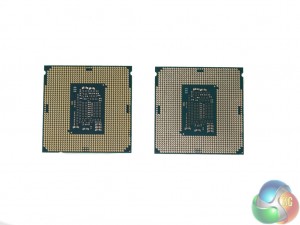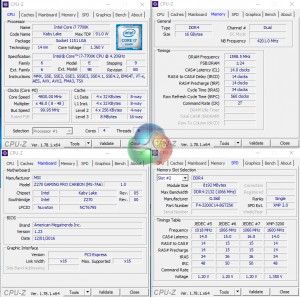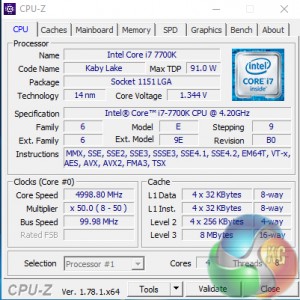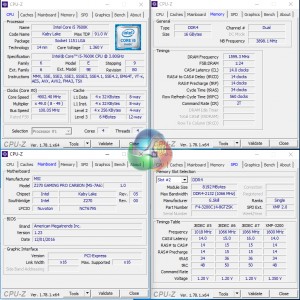As was the case with Skylake, overclocking with Kaby Lake is fun! The voltage regulator is still separate from the CPU and the BCLK is completely open to be tweaked. Add in the process node optimisation and higher out-of-the-box frequencies and Kaby Lake starts to refresh fond memories of the old Sandy Bridge days of overclocking.
We gravitate our overclocking testing around adjusting the core ratio route with a static 100MHz BCLK. This is the most straightforward way of overclocking and is likely to be used by those who want quick, simple gains without the significant effort expenditure that BCLK tweaking requires.
Kaby Lake's new AVX Offset Ratio feature is another factor to consider when overclocking. We decided against using it when overclocking our chip in case it caused issues with gathering data from the overclocked chip (though later testing highlighted its ability to function correctly). However, we would certainly advise readers to find a stable non-AVX frequency and a stable AVX frequency and then use the offset ratio to link the two together. This will allow the chip to operate at its maximum stable speed all the time without BSODing under AVX operations.
We initiated testing using a 1.40V CPU VCore for the overclocking tests. Using a strong CPU cooler (such as the Noctua D14 or Corsair H100i) is important when pushing Kaby Lake to 1.35V and above. Using a Corsair H110i GT we observed unusual thermal performance that seemed to be driven by Kaby Lake's reaction to operations at certain stages of the Prime 95 v28.10 in-place large FFTs stability test.
Power consumption would spike by more than 50W and CPU temperatures would almost instantly shoot up to more than 90°C. When this unusual period of stress was complete, the CPU would drop back down to temperatures in the 70°C range. This is important as it effectively ruled out extended 1.4V testing without opting for custom liquid cooling or de-lidding the processor.
As such, the voltage level was quickly reduced to 1.35V CPU VCore, LLC Mode 4 was applied using our MSI Z270 Gaming Pro Carbon test motherboard as this delivered a continuous voltage close to 1.35V without significant drop or overshoot under load. Stability at the given frequency was confirmed once more than 1 hour of Prime 95 in-place large FFTs testing was completed without thermal throttling.
In short, our i5-7600K and i7-7700K overclocking settings were:
- 1.35V CPU VCore (retail CPUs)
- Mode 4 LLC (1.344-1.360 VCore in OS)
- Prime 95 in-place large FFTs 1+ hour stability test
- XMP-3200 DDR4
- Cache frequency maintained at 4.2GHz forced-turbo value
Intel Core i7-7700K Overclocking
The best Prime-stable overclock that we could achieve using 1.35V was 4.8GHz (48 x 100MHz). This is as expected for a 1.35V VCore as bumping up to 5GHz with Prime-stability will generally require more than 1.4V and a very good chip (not to mention cooling), based on information we received.
Around 4.8GHz should be a safe bet for most 7700K users. Those who insist on Prime 95 stability and want to stick below 1.35V, as we did, may have to settle for 4.7GHz but it's unlikely that anything lower will be necessary. At this level of voltage and stability testing, a strong AIO liquid cooler is effectively a must as air coolers will struggle unless very high speed fans are used.
We pushed the chip to its limit at 1.35V which was 5.0GHz. This was not Prime 95 stable (workers would drop out) although it did pass an extended period of AIDA 64 stability testing as well as multiple Cinebench and Handbrake runs. It was effectively all-but Prime stable.
This is where the AVX offset ratio for Kaby Lake will prove useful. Our CPU is stable at 5.0GHz with 1.35V provided AVX workloads or Prime 95 are not loaded. In this case, we could easily set the CPU to 5.0GHz and then set a -2x multiplier AVX ratio offset to back the chip down to 4.8GHz when anything AVX-related is loaded.
Simply put, 5.0GHz without Prime 95 or harsh AVX stability should be achievable for 7700K users while also staying at around 1.35V or less. A good chip may push to 5.1GHz but that's likely to require closer to 1.40V (or higher) to maintain stability.
Intel Core i5-7600K Overclocking
Superb overclocking performance continued down the scale to the i5-7600K. We managed to take our retail 7600K sample to 4.9GHz with complete Prime 95 stability. 5GHz should be achievable if Prime 95 stability is not required.
Similar temperature fluctuation behaviour was observed with the i5-7600K, though not to the same level as the i7-7700K. The chip would still spike to 90°C and higher using a Corsair H110i GT CPU cooler but the time spent at those higher temperature levels was lessened.
Pairing a £100+ AIO liquid cooler with a ~£200 CPU is unlikely. If you are using something more moderately priced to cool the i5-7600K, either backing off on the applied voltage or not using Prime 95 for stability testing would be good suggestions for keeping temperatures in check.
 KitGuru KitGuru.net – Tech News | Hardware News | Hardware Reviews | IOS | Mobile | Gaming | Graphics Cards
KitGuru KitGuru.net – Tech News | Hardware News | Hardware Reviews | IOS | Mobile | Gaming | Graphics Cards







Rushed out as an answer to Zen/Ryzen. You’re stupid if you buy one of these now without seeing what AMD will offer.
No, kaby lake was announced that will be little boost from skylake, the best of intel is coming from Cannonlake
It’s barely a “little boost”. Clock for clock, benchmark results show literally 0 improvement. Only improvement is slightly better OC.
Very disappointing performance it’s almost the same with 6700k why intel bothered to release this ??
Cannonlake looks more promising
Most pointless intel release to date. The day they go back to dropping the igpu on the i5/i7 range and keep them for the i3 will be the day we actually get improvements. I would expect if they dropped a CPU with a 5.0GHz out the box speed and some decent gains whilst loosing the intergration then almost all gamers running dedicated GPU’s would take note and buy.
As it is there is zero reason to look at this and wait to see what Ryzen (release January 2017) and Cannon Lake (Late 2017) do really if you have anything in the i5/i7 4 series or above.
It may well be that Cannonlake is the answer to Ryzen, however the release of the 7700k is inline with the Ryzen release and Cannonlake will be 9-11 months later.
The though that there will be people out there who’ll upgrade from Skylake to this…..
under performing junk I will pass
Not from Cannonlake. From Ice Lake in 2019. Intel is in a bad situation right now. They have no real developments in the works until 2019. Kaby Lake up to Coffee Lake are simple increments. Kaby Lake is just a Skylake refresh with a different name, and Coffee Lake will just be Cannonlake with six cores coming to the mainstream platform; essentially, the low-tier of Cannonlake-E rebadged. Like Broadwell-E’s 6800K/6850K.
I was hoping for better I was going to finally jump from my 2600k to this gen but there is very little difference between my cpu and 6700k and it looks like there is no difference between that and this new gen.
Hey y’all, i’ve read thru your comments about the Kaby Lake 7700k and I have a request. I am FINALLY able to afford to upgrade my “gaming rig” which is an old ThinkCenter Pent Dual Core E5500 with an Nvidia GeForce GT 730, so anything will be mo betta… My question is what to buy as the heart of a new Gaming Rig? I am Network Spt specialist so I can assemble myself but im not up to date on the best gaming gear. If you could please make recommendations? I can probably spend up to $1800 that I received from my late mother’s estate. Thanks, plz dont hate, i really need your input. Peace!
Best to wait for Zen, then you can get an i7 or the equivalent AMD CPU depending on which performs better or is better value for money.
Im on the same boat buddy, tired of this deliberate turtle play from both AMD and Intel.
Thank you, since you replied I’ve watched the Zen video at https://www.youtube.com/watch?v=4DEfj2MRLtA and I am definitely going to wait for the Ryzen release. In the mean time I will research the AM4 Mobos available and try to choose one. I have long been an avid Nvidia fanatic and never once thought about using a Radeon card but I must admit I find the new AMD Vega interesting. I am looking forward to seeing the benchmarks on it and possibly purchase one for my new gaming rig.
i returned my skylake for this, it was just a few dollar more considering the return cost. I think if i wasnt in the return window though there’s no chance id spend money on upgrading.
I needed(Old one died) a new CPU that’s the only reason I got kaby lake
I like the z270’s though
http://www.dell.com/en-us/shop/productdetails/alienware-aurora-r6-desktop/dpcwxt03s?selectionState=eyJGUHJpY2UiOjE3NzkuOTksIk9DIjoiZHBjd3h0MDNzIiwiUXR5IjoxLCJNb2RzIjpbeyJJZCI6MTQ2LCJPcHRzIjpbeyJJZCI6IjcyMUpEOSIsIlByaWNlIjo0MDAuMH1dfSx7IklkIjoxMTYsIk9wdHMiOlt7IklkIjoiODUwTENPRCIsIlByaWNlIjoxNTAuMH1dfSx7IklkIjoxNiwiT3B0cyI6W3siSWQiOiJEVkRSVyIsIlByaWNlIjozMC4wfV19LHsiSWQiOjQsIk9wdHMiOlt7IklkIjoiVVNLWUJEIn1dfSx7IklkIjoxMiwiT3B0cyI6W3siSWQiOiJBTFdNU0UifV19LHsiSWQiOjU5NywiT3B0cyI6W3siSWQiOiJEVkRTVyJ9XX0seyJJZCI6NzQ5LCJPcHRzIjpbeyJJZCI6IkNJN0tCTCJ9XX1dfQ%253D%253D